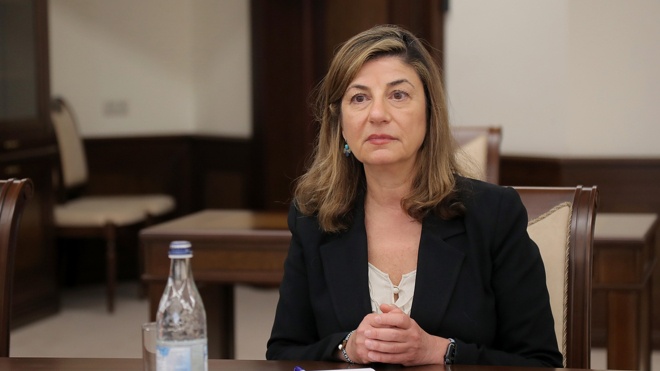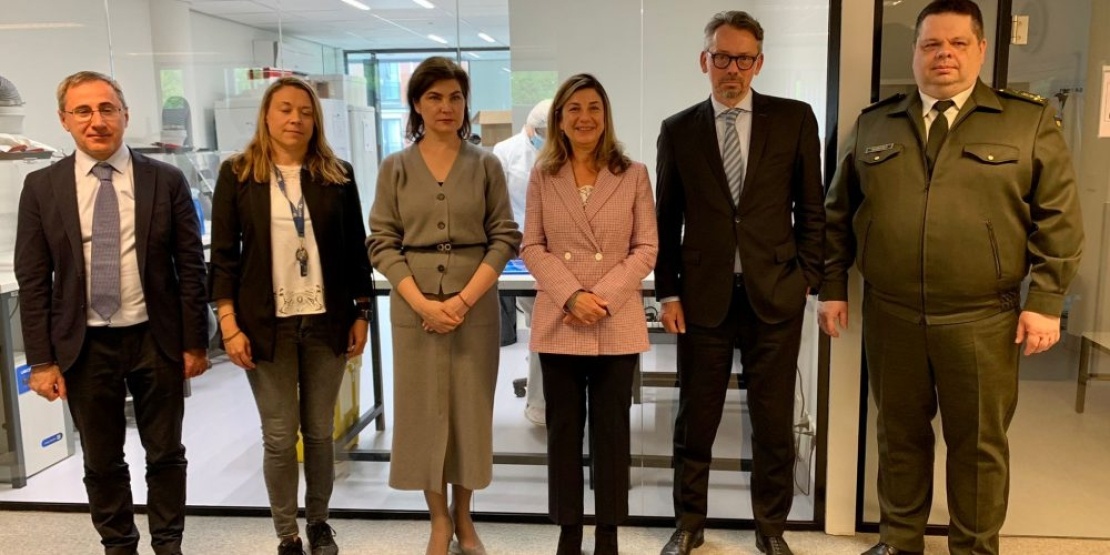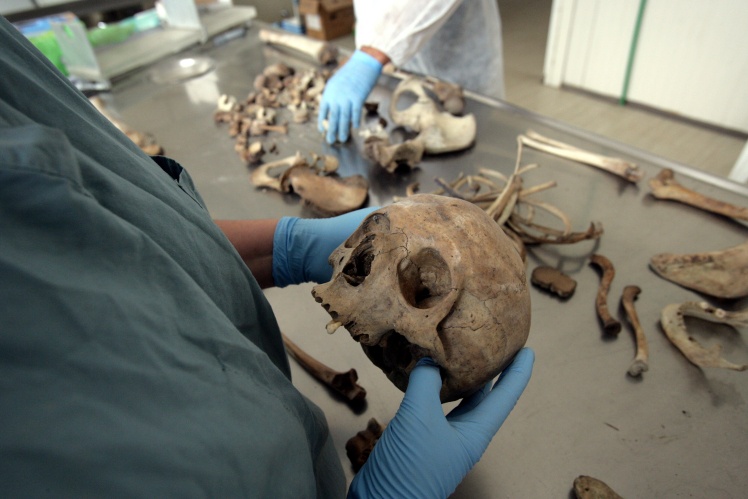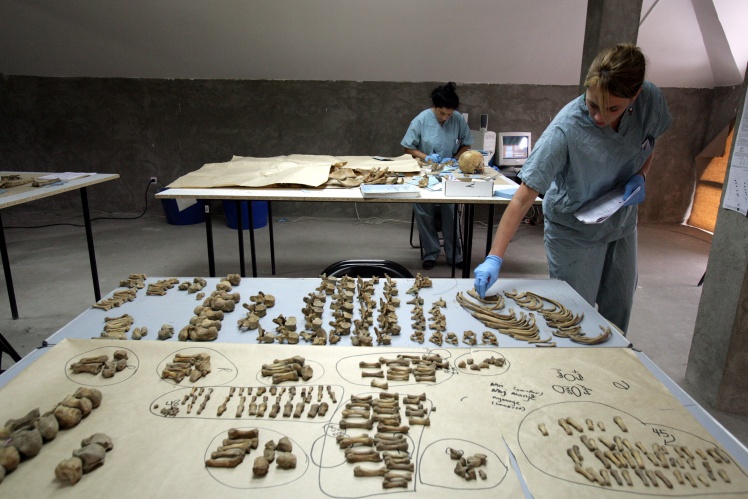What exactly does your commission work with? Because if we talk about the war in Ukraine and the missing, we understand that a person may be alive, but he or she was deported to Russia or taken hostage. However, it also can be an attempt to identify the bodies in settlements liberated from the Russians.
We are an intergovernmental international organization established by the countries under the agreement. And it is important that people do not think that we are a non-governmental organization founded by civil society. In the former Yugoslavia, we helped governments, because, under international law, itʼs the governmentʼs responsibility to find the missing. And it is very important that the state takes a leading position in the search. Not every country does this. Ukraine is fulfilling its responsibilities. People who have disappeared in Ukraine may be alive or dead, they may be citizens of Ukraine or of other countries. Until we find them, we wonʼt know for sure. Therefore, we help the state to get the information about all the circumstances.
What exactly are you doing in Ukraine?
We have been cooperating [with the Ukrainian government] since 2014. Even then there were many missing people, but now there are thousands of them. In such a situation, it is difficult for the country to fulfill its responsibilities. Therefore, our task is to help Ukraine find thousands of missing people, to ensure that evidence of related crimes gets to Ukrainian courts, the International Criminal Court, or any other court that works under universal jurisdiction.
We also help identify not only Ukrainian citizens, but also foreign and Russian military and journalists. All families have the right to know what has happened and to demand justice and reparations from the Russian side. So you need help.
International Commission on Missing Persons.
icmp.int
There is a story about a 15-year-old girl who disappeared. Her family was leaving an occupied village in Kyiv Oblast, her parents were killed, her younger sister was dumped by strangers, and the wounded girl was taken by a tank crew to the Russian military. There are witnesses who heard that the Russians wanted to take her to a hospital in Belarus. However, it is not possible to establish where she is now, Belarus provides no help in this. And it is unknown whether the child was alive or dead. Can the Commission help with such cases?
We will help Ukraine with all the cases it faces. If we are asked to focus on this case, we can. But I think that cases that go beyond Ukraine — to Belarus or Russia, will be much more complicated. If the state does not show the political will to allow you to find a missing person, it will be difficult. Unfortunately, this is the case all over the world. We are currently working in Syria, and that regime does not have the political will to find 130 thousand missing people. This is the key to everything.
There are two things to do here. We need to collect information and DNA from relatives of missing people. And to investigate the case in Ukraine, to gather information about all the people who disappeared: where they may be, whether they were deported and if so, where exactly. And then apply political pressure on the countries involved.
There is a well-known situation when a woman — a military doctor — was not released from the filtration camp organized by the Russians, and her four-year-old child was sent to the free Ukrainian territories alone. How can you find the mother?
As I said, the most difficult cases are when a person finds himself or herself on the territory of Belarus or Russia. But already now we need a set of all the material and oral evidence, all data. Crimes are committed every day. It is important to find those who are alive, the missing girl, the mother who could be deported to Russia, and many others.
By the way, itʼs worth mentioning the role of civil society. It is very powerful in Ukraine — and is the backbone of all recent changes. It also has a voice and can demand from the government what it wants, to set priorities. It can be a dialogue between the government, civil society, and the families of the missing. Cooperation will build trust in public institutions that search for people.
How can the commission help in this case?
I will tell you about the example of the former Yugoslavia. It was a genocide. In 1995, more than 8 thousand Muslim men and boys were killed in three days. They were buried in mass graves. And then the criminals returned, took the bodies out of the graves, and tried to destroy the evidence of the crime.
It was a long investigation, thatʼs where we first started using DNA technology. And today almost 90% of the bodies have been found. It was all within one country. Therefore, such searches are a very complex process. Ukraine is now beginning to gather evidence that provides a real understanding of what happened.
UN tribunal investigator removes land from bodies in mass grave near Cerska, a village not far from Srebrenica
Getty Images / «Babel'»
How is identification being done?
During the investigation in Srebrenica, we found that if you use DNA as your primary identifier, you can move very fast and have verified and irrefutable evidence that helps in various cases — criminal, guardianship, and inheritance. This allows people to be quickly identified and linked to the crime scene, even if the body is exhumed and relocated afterward.
As soon as the investigation is done, the bodies are exhumed, it is very important to take DNA samples from each one. This must be done in accordance with Ukrainian law. We take a sample and take it either to our laboratory in the Hague or to a local laboratory if it can perform the required test. It is important to keep all data in one place. Next, you need to collect reference samples from relatives.
After that, an array of data is built: you know where the body was found; you may have established the place of the crime of the body was moved; you took a genetic sample and analyzed these data; identified the location of relatives from whom DNA can be taken; and then, hopefully, you find a match. All materials must be prepared in such a way that they can be submitted to the International Criminal Court. They donʼt have to go there — their cases can get to local courts. However, they must also be ready for the ISS.
What is your help to Ukraine?
It is more of a partnership than a help. Maybe we will start a joint investigation, because there are thousands of cases — one country would not cope with it on its own. We need a centralized database, and we will provide it. The process requires the coordinated work of many institutions. These are the Ministries of Foreign and Internal Affairs, Justice, Health, the Prosecutor General, the Commission for the Search for Missing Persons, etc. We will help coordinate this interaction.
Civil society needs to have a good understanding of how to collect data, to prepare reports, and understand the process of finding missing persons so that public institutions can continue to work with this civil society and families. This is the most important.
Are you helping to find out the cause of death?
There is a stumbling block here, because of which we cannot conduct examinations and determine the cause of death. I will explain. Imagine we did a DNA test, we have all the information about where the body was, we have all the data and all the clues, we got the DNA match and we can say the personʼs name. This report is then forwarded to the Office of the Prosecutor General or the National Police. They have to find out what exactly caused the death, to conduct examinations — this is an internal process that Ukrainian institutions are engaged in. It must comply with Ukrainian law, because the examination materials will go to court.
If Ukraine needs help with this, we need to understand how it can be provided legally, that is, so that everything complies with local legislation.
Forensic anthropologist Laura Yazedjian from Canada examines a skull at the International Commission on Missing Persons' (ICMP) Podrinje Identification Project Center July 13, 2005 in Tuzla, Bosnia Herzegovina.
Getty Images / «Babel'»
It is already known about the mass burials of people killed by the occupiers. The Russians are also trying to hide their crimes and get rid of their bodies. Is it possible, despite Russiaʼs efforts to hide the traces, to bring the perpetrators to justice?
This is what happened in Srebrenica. As I said, 8 thousand men and boys were killed there. There were satellite photos that pointed to the places of mass burials and proved their existence. The criminals returned, exhumed the bodies using heavy equipment, and buried them in different places, sometimes 50 kilometers apart. In 1998 we started the search.
To identify one person, we needed at least seven DNA matches, because sometimes we can find small particles of the body that are completely dismembered. In the end, we were able to do it. And itʼs a miracle! Because when we started working there, we thought it would never work. But a new problem arose — how to determine the cause of death. After all, it was not always possible to see holes from, for example, shots to the head — the bodies were very badly damaged. But we were able to confirm that genocide had taken place. Because they were able to prove that these bodies are from the same place where the crime was committed — from the place of execution. We were able to provide evidence to the tribunal, where [Radovan] Karadzic and [Radko] Mladic were on the dock. We were able to say that there were 7 thousand people who could be identified at the time.
But I must admit that there are cases when it is very difficult to establish even DNA. I wonʼt tell what criminals do for this purpose.
A photo showing, according to NATO, a place for mass burials of Kosovo Albanians killed by the Serbian army.
Getty Images / «Babel'»
Now many Ukrainians have left Ukraine, some are in Europe, some have moved even farther. How realistic is it for them to hand over their DNA samples so that the data can be found in the database to search for relatives?
As soon as we resolve everything with the Prosecutorʼs Office, because Ukraine has to tell us exactly what help we need, I will have a clear answer. But from our experience in Yugoslavia, I can say that it is possible. We collected 100 thousand DNA samples from relatives of the missing. And these people were in the former Yugoslavia, some moved to Europe, some to North America, some to Australia. If Ukraine wants, we can do the same. It is the country that decides what it exactly needs our help with, because we are partners.
But itʼs so hard. For example, I spoke to a person who worked with bodies in Bucha. And she said that they processed more than 200 bodies a day. 130 people came to take their samples, but there were only 30 matches. Why?
I will return to the experience in Yugoslavia. These were very different cases. In Srebrenica, we used only DNA, and the percentage of matches was very high. And I would continue to rely on this. We will continue to recommend Ukraine to use DNA. Yes, the problem may be that not everyone will pass the samples. But finding the reasons why this happened is part of our job. Because it is necessary to identify all bodies.
That is, as many people as possible should provide samples?
We would recommend running a mass campaign to collect data from all family members. Providing DNA samples is purely voluntary. We need to talk about why it is necessary, understand why people refuse, and work with it. For example, explain that these samples are needed and will be used only to identify members of this family and for potential evidence in a criminal case. It is still difficult to persuade a family to give samples, because they will never believe in the death of a loved one if they do not see the body. Therefore, working with families is also an emotionally difficult process. You need to work directly with families all the time.
Translated from Ukrainian by Anton Semyzhenko.
Babel records Russiansʼ war crimes in Ukraine on a daily basis. You can support us so that we continue to do this: donate in hryvnia 🔸 in cryptocurrency 🔸 via PayPal.



